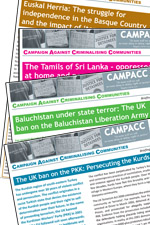Terror bans
News about the terror bans
(London) CAGE is outraged by the arrest of our Outreach Director, Moazzam Begg. A former Guantanamo Bay detainee, he has been campaigning for due process and the human rights of victims, despite suffering over three years of torture and abuse by the US government with the complicity of the British security services.
We wanted to remind you of this ongoing joint appeal from CAMPACC and Peace in Kurdistan campaign to finally remove the PKK from the terrorism list as a means of giving peace negotiations between Turkey and the Kurdish movement the best possible chance.
Press Release 21 January 2013 - On 18 January a public meeting opposed MI5’s widespread practice of blackmail. MI5 has been pressurising people under various threats so that they become informers on political views of Muslim and migrant communities. The meeting focused especially on the case of the former Camden resident Mahdi Hashi, whose UK citizenship was revoked last year as punishment for refusing to become an informer.
26th January 2013 - The Day of the Endangered Lawyers on 24 January 2013 was marked by simultaneous actions by lawyers taking place in major cities across Europe. The day of action was organized this year by three European European lawyers’ associations: the European Democratic Lawyers (AED-EDL, www.aed-edl.net), the European Lawyers for Democracy and Human Rights (ELDH, www.eldh.eu) and the European Bar Human Rights Institute (IDHAE, www.idhae.org). Together they represent lawyers all over Europe.
Statement in defence of Roj TV 28, October 2012 - In January this year, the City Court of Copenhagen ruled that Kurdish satellite station Roj TV was promoting terrorism through its coverage. An appeal has been made against the decision and this will be heard on 29 October. Furthermore, eight people have been arrested during police investigations into Roj TV for allegedly providing financial assistance to the Kurdistan Workers’ Party (PKK). Meanwhile, the Danish Radio and Television Board cancelled Roj TV’s broadcasting licence in September for two months, claiming that documents and videos requested from Roj TV for the board's own investigation were not provided.
Activists from Kurdistan, Colombia, Ireland and the island of Sri Lanka, talking about the role geopolitics played in determining peace-processes and conflict in various cases, informed a mixed audience of activists, academics and journalists of the nuances of their respective cases connecting it with larger trends at an event organized at Trinity College, Dublin on Thursday, 24 May 2012.
“The Sri Lankan conflict is now a transnational war against the Tamil diaspora that enables the continued political repression of political aspirations both in Sri Lanka and abroad,” writes Dr. Vicki Sentas in a chapter published in a recently released book “Counter-Terrorism and state political violence: The ‘war on terror’ as terror”.
10 citizens and over 390 prisoners start hunger strikes and protests in solidarity with Iosu Uribetxeberria. 11 members of Herrira (asociation for rights of political prisoners) and over 390 prisoners in Spanish and French different jails have started hunger strikes and protests in solidarity with Iosu Uribetxeberria.
For more details read the CAMPACC paper:
Opposing the UK 'Terrorist' List: Persistence as Resistance February 2009 (pdf file)
 CAMPACC has produced 4 new briefings, available to download (pdf format):
CAMPACC has produced 4 new briefings, available to download (pdf format):
Baluchistan under state terror: The UK ban on the Baluchistan Liberation Army
Euskal Herria: The struggle for independence in the Basque Country and the impact of ‘terrorist’bans
The UK ban on the PKK: Persecuting the Kurds
The Tamils of Sri Lanka - oppressed at home and persecuted in the UK
See recent CAMPACC work on:
Reports and speeches from a public meeting in Parliament in October 2009 on the purpose and continuing effects of the Terrorism Act 2000 in proscribing 'terrorist organisations'.
Two seminars on The Basque Country and Northern Ireland: Self-Determination, Proscription and Human Rights in the EU
Organised by CAMPACC, Haldane Society of Socialist Lawyers, Statewatch, Basque Solidarity Campaign, June - July 2009
A seminar series on 'Terrorist lists', proscription, designation and human rights
Organised by CAMPACC, the Haldane Society of Socialist Lawyers and Statewatch, 2008
'Terrorists' lists: monitoring proscription, designation and asset freezing
In June 2005 Statewatch, CAMPACC and the Human Rights and Social Justice Institute set up the 'Terrorist' list website monitoring proscription, designation and asset freezing.
Charities accounts frozen or denied
Under the ATCSA 2001, the authorities can seize property or cash, and freeze bank accounts, in cases of suspicion about 'terrorist' purposes. These powers have been used to investigate charities and to freeze their bank accounts. A prime target for such harassment has been Interpal, which funds humanitarian activities in occupied Palestine, yet investigations have found no evidence of terrorist links.
Communities targeted for harassment and prosecutions
CAMPACC has been campaigning against anti-terror laws being used against Kurdish, Tamil and other communities.
See CAMPACC responses to legislation:
CAMPACC Submission to the Joint Committee for Human Rights on the Terrorist Asset-Freezing etc. Bill, October 2010CAMPACC submission to the Privy Council Review: Terrorising Minority Communities with 'Anti-Terrorism' Powers: their Use and Abuse, August 2003 (pdf) and read the Privy Council Review of the Anti-Terrorism Crime and Security Act 2001, Dec 2003 (pdf)
The Real State of Emergency. A comprehensive guide to the Anti-Terrorism Act 2001 published by CAMPACC in 2003
The end of Internment? CAMPACC statement in reponse to the Law Lords’ ruling on indefinite detention, 23 December 2004 and Read the Law Lords damning judgement on detention without trial (383kb), 16 December 2004 (pdf)
A Permanent State of Terror? a book published by CAMPACC in association with Index on Censorship, October 2003
See the legislation:
Full text of the Terrorism Act 2000
List of Banned Groups and Entities